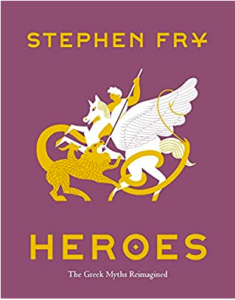Greek myths have been my jam since I was a little girl. I knew the entire pantheon by heart by the time I was 8, and to this day feel that two of the best gifts I’ve ever received were an illustrated version of The Odyssey when I was 14 and the Penguin Classics translation of Ovid’s Metamorphoses from my mom just after college. I’ve devoured modern updates, with undoubtedly the best being the child-friendly Percy Jackson series by Rick Riordan and, for adults, Ted Hughes’ incomparable, bloody-minded Tales From Ovid. So when Chronicle Press, out of nowhere, offered me an advance copy of Stephen Fry’s Heroes, there was no way I was saying no.
 Having dealt with said pantheon and the creation myths in his first volume, Mythos, Mr Fry turns his eye to the mortal Greek heroes (or at least the ones who started out as mortals) pre-Trojan War, whose names and stirring exploits continue to echo down the centuries. I appreciated the fact that “hero” is used in a gender-neutral fashion, as Mr Fry notes that it was originally a female name anyway, and that Atalanta gets her own chapter here. Aside from the fleet-footed princess, Perseus, Heracles, Bellerophon, Orpheus, Jason, Theseus and Oedipus all have their adventures narrated, or reimagined rather, in Mr Fry’s distinctive voice. The tone is so very British, with droll wit and a view of heroism that is by turns stirring and self-effacing. It’s well-researched, with terrific footnotes, an index and a pages-long cast list of characters. The illustrations are gorgeous and appropriate. Younger me would have loved this book so hard.
Having dealt with said pantheon and the creation myths in his first volume, Mythos, Mr Fry turns his eye to the mortal Greek heroes (or at least the ones who started out as mortals) pre-Trojan War, whose names and stirring exploits continue to echo down the centuries. I appreciated the fact that “hero” is used in a gender-neutral fashion, as Mr Fry notes that it was originally a female name anyway, and that Atalanta gets her own chapter here. Aside from the fleet-footed princess, Perseus, Heracles, Bellerophon, Orpheus, Jason, Theseus and Oedipus all have their adventures narrated, or reimagined rather, in Mr Fry’s distinctive voice. The tone is so very British, with droll wit and a view of heroism that is by turns stirring and self-effacing. It’s well-researched, with terrific footnotes, an index and a pages-long cast list of characters. The illustrations are gorgeous and appropriate. Younger me would have loved this book so hard.
But older me can’t help reading even this modern adaptation and thinking of the damage these myths, so foundational to Western civilization, have done to millions of people over the centuries. Actually, I should say that that dread influence never really hit home till I read this book in particular. From heroes threatening each other with the wrath of their daddies; to the excuses given for crimes including murder; to the casualness with which rape is handled, contrasting with the pervasiveness of the false rape claim, it’s hard to read these stories of Greek heroes, these paragons held up for generation after generation of classical education, and not shudder at the way that toxic masculinity has been enshrined, through them, from an early age in the bosoms and brains of Western readers. I’m not sure if it was Mr Fry’s intent to underscore how really shitty classical Greek culture could be, and how millennia later we’re still suffering from the nonsense mindsets it espoused, but that was absolutely my main takeaway from reading this.
I did very much enjoy his afterword, even if my conclusions differ somewhat from his. While he wonders at the literalness of the myths — was someone actually cursed by a god, or was it just bad shit happening? — I prefer to think of myths as the explanations of those who didn’t have the linguistic, perhaps even intellectual and certainly experiential, capacity to explain real-life events. I have no doubt that Heracles’ rages came from a medical condition such as PTSD, and weren’t actually delusions sent by a jealous goddess, but how politic is it to claim, in a civilization that relied on warfare in order to expand, that violence and fighting could fuck with your head? Better to claim it a curse from the goddess of domesticity, whose constant maligning is a whole other kettle of fish altogether.
Myths and stories are continuously shaped and molded by their tellers over time. I believe that these heroes once existed as ordinary people who did extraordinary things that, over the centuries, got jumbled up with one another, with the details being embellished or forgotten to suit the storyteller, and that metaphor was often taken as literal once eyewitnesses began to die off and their children could only know things at secondhand at best. And for all that I have a very dim view of the negative legacy of the ancient Greeks’ machismo — tho in their defense, it certainly wasn’t they who downplayed the almost ubiquitous bad end that came to each of our heroes — I cannot deny the charm and wonder, and even instructional merit, of these tales. Mr Fry has done a tremendous job of highlighting each in a highly entertaining fashion. I just don’t know if I’m meant to feel so sad at the end of it all, from seeing how damaging to our psyches our long veneration of these myths have been.
